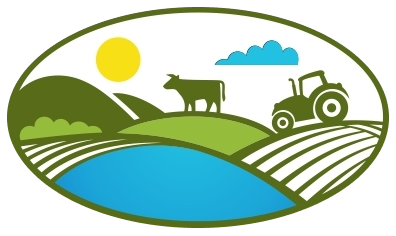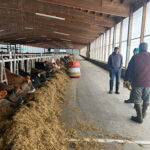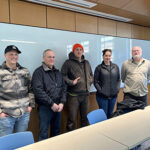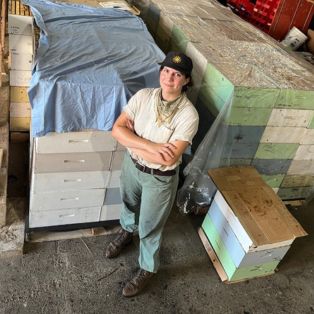
This spring, we sat down with one of the newest members of the Champlain Valley Farmer Coalition: Bianca Braman, beekeeper and co-owner of Vermont Bees in Swanton. We learned a lot about bees, and the environmental and economic considerations that go into beekeeping!
But first! A note on terms. A colony is a group of many bees who live and work together in a hive. A hive is a home for bees. And an apiary is a collection of colonies cared for by a beekeeper.
Champlain Valley Farmer Coalition (CVFC): How did your apiary get started?
Bianca Braman: Vermont Bees was started in 2015 by my partner, Adam Collins, and his father, Bruce. At that time, they had 12 colonies, but we’ve since grown to 350. We’ve grown by building all of our own wooden hives, splitting off small groups of bees from colonies, and rehoming them in the new hives. It’s kind of like splitting off plants to grow new ones–a different process, but similar idea.
CVFC: How did you get into beekeeping?
Bianca: I’ve always been interested in insects. When I was seven years old, I was really into monarch butterflies. I was raising them in buckets and tagging them for their trip south to track their movement and their health. Later, in my early twenties, I joined a beekeeping club in the Adirondacks. I eventually got my own bees and was doing it as a hobby, when I realized, “Oh! This is a career choice!” Around this time, I met Michael Palmer of French Hill Apiaries in St. Albans. I started working for Michael, which is where I met Adam. Mike has more than 50 years of beekeeping experience, and he’s been a wonderful mentor to both Adam and me. In 2019, I started working with Adam and Bruce at Vermont Bees, and became a third owner in 2021.
CVFC: What is your role at Vermont Bees?
Bianca: As a part-owner, I’m involved in everything! I’m the lead in queen production and accounting, but other than that, Adam and I split all the other responsibilities.
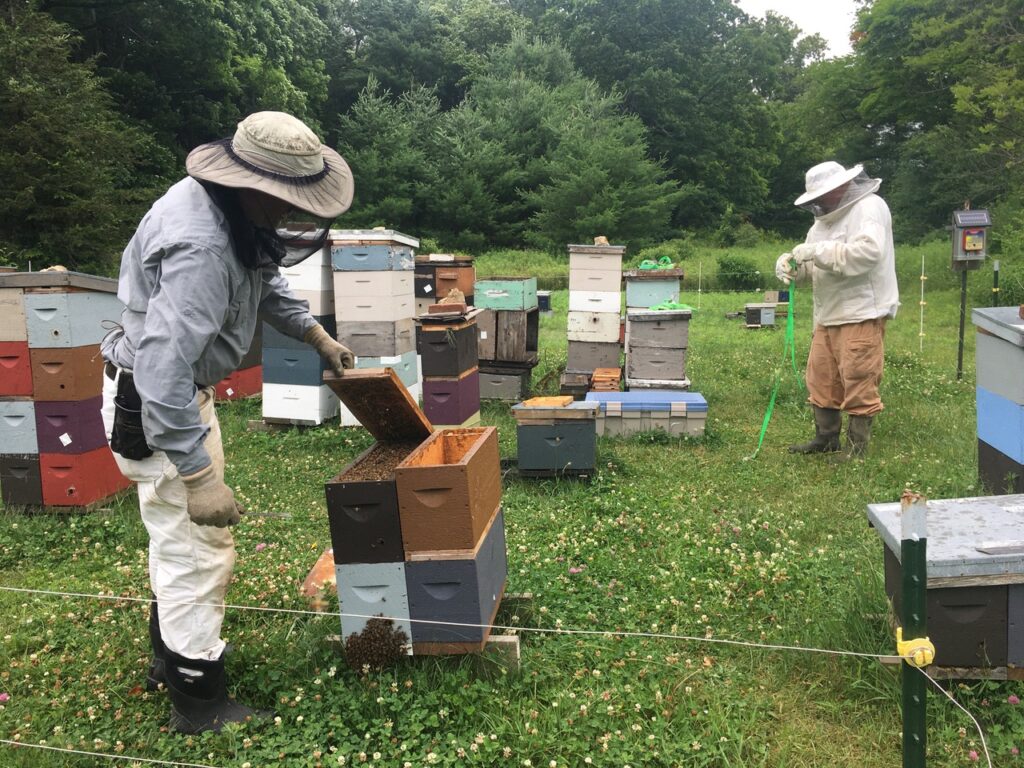
CVFC: What does a typical day look like for you?
Bianca: It varies so much throughout the season. Typically, we get up pretty early and head to our shop, which is 10 minutes from our home. All of our bee supplies are there, as well as our woodshop. Depending on the time of year and what needs to happen, we may spend all day in the woodshop, or we’ll head to our bee territory.
CVFC: Where’s your bee territory?
Bianca: Beekeeping is not what you envision when you think of other types of farming. We are located on many farms over a few hundred square miles. We’re in the Champlain Valley, but we’re in the Champlain Valley of both Vermont and New York. We have 22 apiaries, each one with 15 or more colonies. That means we have around 350 colonies, and we hope to grow to 700-1000.
CVFC: Why do you have apiaries spread out over many farms instead of one?
Bianca: Bees forage, they say, up to five miles of their hive, but really it’s more like within a mile-and-a-half. Given the way humans populate the earth, there’s just not going to be enough forage to sustain that many colonies in one area. Certainly, there are monoculture farms, especially in the western United States and Canada, where there’s a lot of plants–say, apple trees–and you can have a lot of colonies. But here in Vermont, where we rely on wildflowers, we spread out the bees so that they can find enough food to forage and keep themselves healthy. It also lowers disease spread. There’s a lot of research showing that having too many colonies together can increase pest and disease spread, as you would imagine with any creature.
CVFC: What makes Vermont honey so special?
Bianca: Our honey is exceptional. Honey from Vermont has been voted twice in the world beekeeping competition as the best honey in the world. I’ve personally tried a lot of honey, and honey from the Champlain Valley is just so good. It’s a multi-floral blend. It ends up being smooth because you’ll have a honey that’s a little bitter, a honey that’s a little sweet. All of these things combine on your taste buds to have a much smoother taste that’s bright and floral. You can taste all of these hundreds of flowers in every spoonful. And it has a beautiful color. We’re very lucky here, it’s a very special thing.
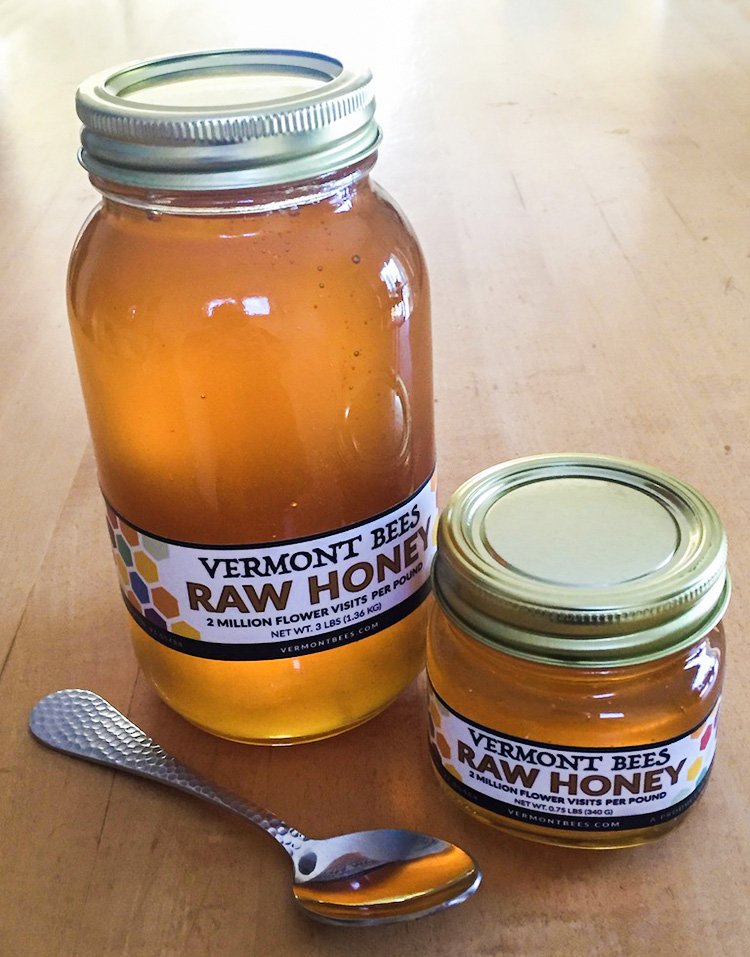
CVFC: Do you sell anything else besides honey?
Bianca: We also sell queen bees to other beekeepers. We have a breeding program and n select queens for their healthiness and general fitness. Because the queen is the reproductive system of the hive, she can influence the genetics of the entire hive.
CVFC: Are there practices in beekeeping to support a healthy environment, in general, and water, soil, and climate, in particular?
Bianca: In beekeeping, there’s not a lot that we do that has a direct influence on water and soil. At the same time, we are responsible for crop pollination and general awareness of environmental health and environmental issues. At Vermont Bees, we do all of our work by hand, which means we’re an artisanal operation. This gives us close involvement with our bees and their products, and gives a good perspective on the environment and climate change. We’re very aware of the changes over the past 15 years. It seems drastic to us because we’re working outside. And so we’re constantly trying to minimize our impact on the earth and the bees, which is easier for us because we’re a small farm.
CVFC: Could you speak a little bit about the changes you’ve observed over the past 15 years and what you think are the drivers behind those changes?
Bianca: Human population growth is one change. More people moving into the state and population growth in general is decreasing the amount of open land with wildflowers for insect forage. The climate is fluctuating, too. It’s definitely warmer here than when I was growing up.
CVFC: What impact does a warming climate have on bees?
Bianca: Bees do better when it’s warmer, but the ancillary issues that come with a warming climate is hard on them. More people means more pesticide use, and therefore a lot more movement of bees. They’re kind of like trees–they prefer to live in one spot.
CVFC: The last two summers in Vermont were polar opposites. Summer 2022 was hot and dry. And, of course, last summer, we were soaked! What impacts do extreme weather patterns have on bees?
Bianca: Dry weather is really hard on the bees. As you can imagine, they’re so reliant on water. They’re this delicate tiny thing and they need water to function well, like all of us do. You would think bees wouldn’t have liked last summer with all of the rain, but they did super well in the valley. The plants were giant and full of nectar. The bees did great, and they’re having an easy winter because they have so much food and the temperature didn’t drop below zero in the valley. Of course, that’s going to lead to more ticks this summer…
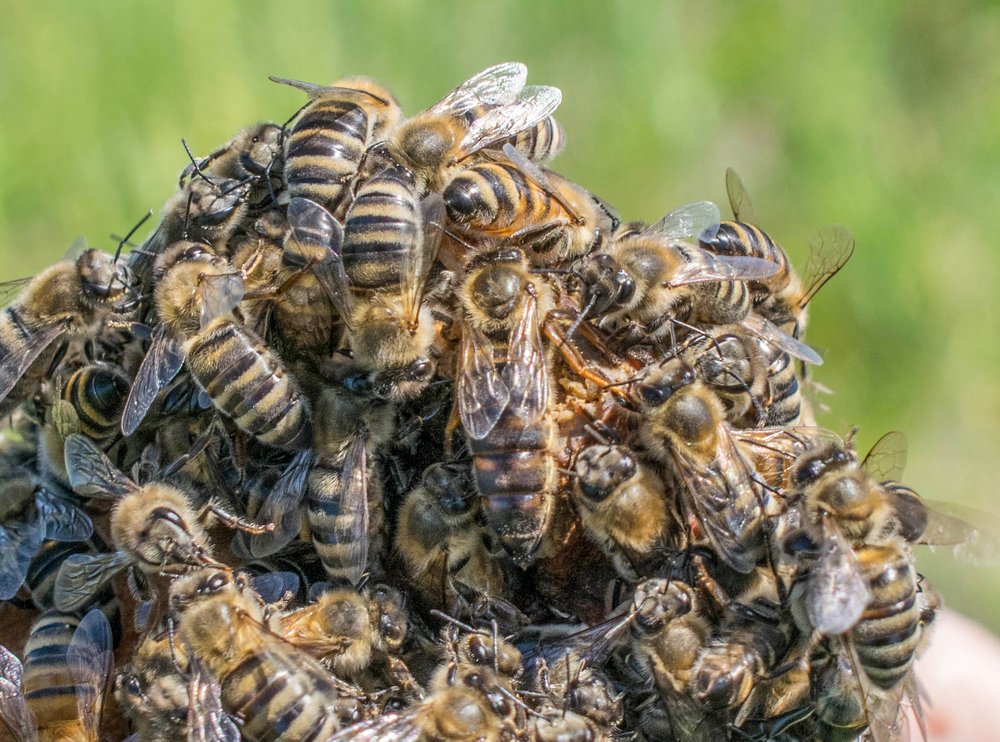
CVFC: It gives you a lot of appreciation for the delicate balance of nature. Bees are like the canary in the coal mine.
Bianca: Absolutely. Like I said, I, as a beekeeper, may not not have a lot of direct impact on water and soil. But having this knowledge of the outdoors and spreading that knowledge is impactful in its own way.
CVFC: Let’s shift gears slightly for a moment. You talk about creating a life for the bees that is very similar to what they would experience naturally. You have this very hands-on, artisanal operation that’s small, which has a lot of environmental benefits baked into it. What are the challenges you encounter as a result of having this gentler approach to beekeeping?
Bianca: The methods we have chosen for farming are not necessarily as lucrative as a larger-scale pollination-based farming. While we’re passionate about our methods, it’s challenging financially at times. We’re stationary and we winter here, and we don’t have a second season to make the extra money by bringing them south for pollination. In turn, putting food on our table comes from the bees being healthy and the honey that they make. We’re totally focused on their health, which is an incredible thing for our relationship with the creature. But in modern beekeeping, to keep bees alive, it’s hard. The average losses in Vermont are 35-85%. We come in at the low side of those losses often because we’re really careful, but there’s a lot that you’re up against that you don’t have any control over.
CVFC: You’re so passionate about how you farm, and you acknowledge there are some economic drawbacks to that. Are there things you’re able to do that support you economically, but still allow you to farm in alignment with what you value?
Bianca: Diversification is part of it, having different things to sell, like queens and candles, in addition to honey. There’s certainly an instability for our type of farming for the first 15-20 years, because we’re constantly growing, growing, growing. At the same time, by starting small versus going all in, it has meant we’ve been able to grow into our shoes instead of having to jam our feet in. It’s more economically sustainable this way. Once you get past the point of constantly expanding, you can have your community developed around the products you’re selling. Our honey is in a bunch of stores, and if we lost one, it wouldn’t be the end of the world because we have some security built in. Whereas in the beginning, it was really risky and scary, and we always had a second job.
CVFC: You’ve taken your time to grow in a way that is both sustainable for you and the environment. Why is it important to you as a farmer to be a good steward of the environment?
Bianca: It’s a difficult balance because farmers are pressed to make more food for our growing population. Being aware of our impacts to the environment and mitigating those impacts constantly is of utmost importance. Working with such a delicate creature and seeing the Earth from this perspective, I can see that there’s nothing more important than preserving it.
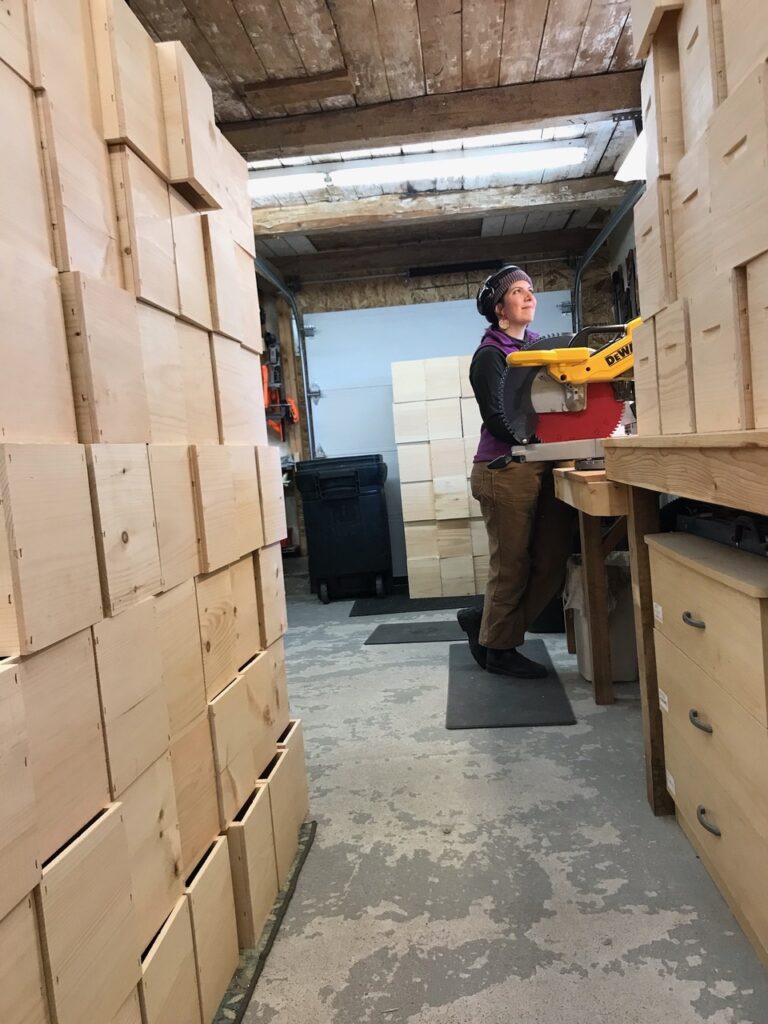
CVFC: Have you received any awards or special recognition for your work?
Bianca: We just received a Working Lands Enterprise Initiative grant to expand production of our honey. It will increase our production by 100%. It’s a beautiful piece of machinery that will last me the rest of my career. It’s all automated and it will save our bodies.
CVFC: You recently became a member of the Farmer Coalition. What inspired you to join us?
Bianca: I’m the Vice President of the Vermont Beekeepers Association, which is one of the oldest bee clubs in the United States and is very well regarded. We have 700 members. They sent us a notice about the Farmer Coalition. My partner and I have been wanting to connect with other farmers forever. What are the dairy farmers up to? The veggie farmers? And we can share a little bit about what we’re doing.
CVFC: What advice would you give to another farmer (or beekeeper!) who’s trying to figure out how best to support the environment through their practices?
Bianca: Everybody’s so different, and I don’t know everybody’s struggle. But, as people who work outside and work with the land and with other creatures, we are learning another language. We develop an instinctiveness around the earth, what’s good for the planet, and what’s good for everybody else (other than humans). It sometimes isn’t the easiest thing, but we can make a difference as farmers. I think we need to support each other!
CVFC: Those are excellent points you bring up. Everybody’s farm is different. Just look at the differences in soil types between Addison County and Chittenden County near the Winooski River. Usually, farmers will say it’s about experimentation. We’re all happy to support one another and share knowledge. But, ultimately, it’s going to come down to trial-and-error on your own farm, and figuring out what works best for all of the variables you have.
Bianca: Exactly! It’s important to be open-minded, progressive, and accepting of what other people’s needs are, as long as they’re not directly harming you. Farmers are trying to do the best thing for everyone by making food for people and by caring for the future. I don’t think you would ever meet a farmer that’s consciously trying to hurt somebody else. We’re working with a really good group of people to support the environment.
